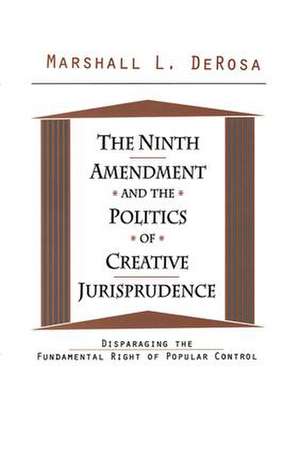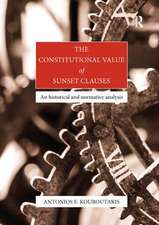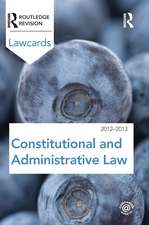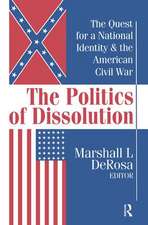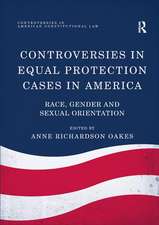The Ninth Amendment and the Politics of Creative Jurisprudence: Disparaging the Fundamental Right of Popular Control
Autor Marshall DeRosaen Limba Engleză Paperback – 29 ian 2018
In this volume, Marshall DeRosa provides a thorough analysis of Supreme Court unenumerated rights policy and offers suggestions toward reestablishing American federalism as envisioned by the framers of the Constitution. The book opens with a review and analysis of current debates over Ninth Amendment rights and then utilizes the privileges and immunities clauses as demonstrative of the traditional relationship between the states' police powers and unenumerated fundamental rights. DeRosa then considers the critical role of academia in shifting public policy away from popular control and toward the judiciary. Later chapters include national and state case studies as instances of judicial creativity, an examination of the effects of Ninth Amendment jurisprudence on the Second Amendment as it bears on the gun control debate, and a comparative analysis of contrasting theories on the status of unenumerated rights. In his conclusion DeRosa offers some prescriptive thoughts on how to restore the original constitutional concept of popular consent as a remedy to an increasingly unaccountable federal judiciary.
By restoring the Ninth Amendment to the context of American federalism, this volume constitutes a major contribution to contemporary scholarship, challenging a corpus of commentary that either ignores, misunderstands, or misrepresents the relevance of popular control in the articulation of unenumerated rights. The Ninth Amendment and the Politics of Creative Jurisprudence will be of interest to political scientists, historians, legal theorists, and political practitioners.
| Toate formatele și edițiile | Preț | Express |
|---|---|---|
| Paperback (1) | 489.26 lei 6-8 săpt. | |
| Taylor & Francis – 29 ian 2018 | 489.26 lei 6-8 săpt. | |
| Hardback (1) | 1001.07 lei 6-8 săpt. | |
| Taylor & Francis – 30 ian 1995 | 1001.07 lei 6-8 săpt. |
Preț: 489.26 lei
Nou
Puncte Express: 734
Preț estimativ în valută:
93.63€ • 101.67$ • 78.65£
93.63€ • 101.67$ • 78.65£
Carte tipărită la comandă
Livrare economică 23 aprilie-07 mai
Preluare comenzi: 021 569.72.76
Specificații
ISBN-13: 9781138516502
ISBN-10: 1138516503
Pagini: 226
Dimensiuni: 152 x 229 x 12 mm
Greutate: 0.45 kg
Ediția:1
Editura: Taylor & Francis
Colecția Routledge
Locul publicării:Oxford, United Kingdom
ISBN-10: 1138516503
Pagini: 226
Dimensiuni: 152 x 229 x 12 mm
Greutate: 0.45 kg
Ediția:1
Editura: Taylor & Francis
Colecția Routledge
Locul publicării:Oxford, United Kingdom
Cuprins
1: The Promise of Judicial Federalism; 2: Privileges and Immunities and the States’ Police Powers: Two Sides of the Same Federal Coin; 3: Roscoe Pound: Strategist for Creative Jurisprudence; 4: Case Studies in Judicial Creativity; 5: A Case Study of Judicial Federalism; 6: The Second Amendment and Creative Jurisprudence: A View from the States; 7: Contrasting Theories on the Articulation of Unenumerated Rights, Bradford v. Dworkin; 8: Prescriptive Thoughts on Reviving the Nomocratic Constitution
Descriere
This is the thirty-first volume in Religion and Public Life, formerly This World, a series on religion and public affairs. This ongoing series seeks to provide a wide-ranging forum for differing views on religious and ethical considerations. The essays grouped together in Culture and Consumption discuss the phenomenon of consumption, an identifiable and pervasive feature of American culture that distinguishes it from other national cultures. The lead article provides an insight into the long-standing pattern of consumption that has been progressively elevated into social policy in America. This is a balanced analysis of the history of the consumption cultural ethos beginning with the undermining of the Native American Culture and ending with Wilsonian Liberal-Internationalism and the demise of the moral authority of organized labor. This commercialization of culture has always competed with the funding vision of a dispassionate social order in which custom, deferential politics, and continuation of traditional hierarchal values would be the constitutional agenda. Another contributor argues that the emergence of the democratic-consumer state in America was anticipated in de Tocqueville's observation that "in democracies nothing has brighter luster than commercea." Other contributor essays treat issues such as the New Class and the consumer state; technology's triumph at the expense of the social and natural worlds; and argue against the materialist perspective in addiction. Culture and Consumption includes the following major contributions: "The Dialectic of Consumption: Materialism and Social Control" by David Brown; "Religion, Social Science and the Ironies of Parasitic Modernity" by Guy Alchon; The Dilemma of Hypermodernity" by Mark Wegierski; "Toward an Epistemology of Addiction" by Leonard Kaplan and Vince Rinella. Also included are book reviews by Martha Davis and Conrad Kanagy. In a concluding essay, Gabriel Ricci reviews
